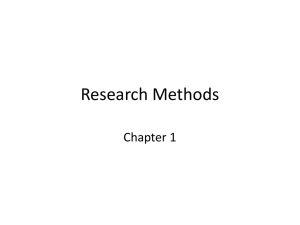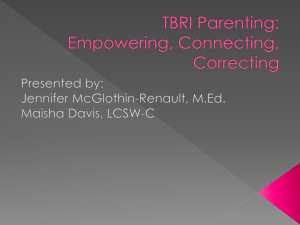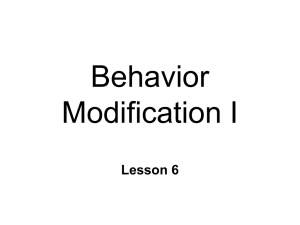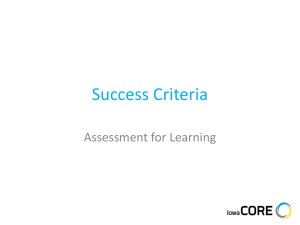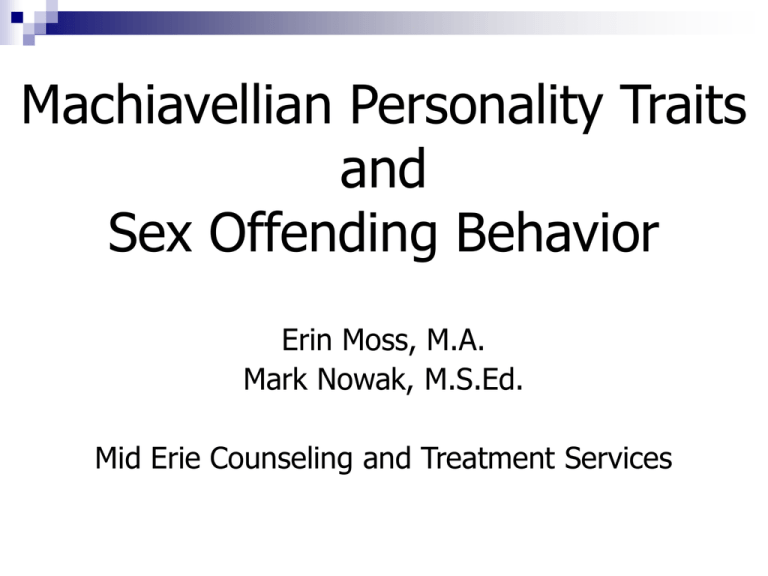
Machiavellian Personality Traits
and
Sex Offending Behavior
Erin Moss, M.A.
Mark Nowak, M.S.Ed.
Mid Erie Counseling and Treatment Services
MACH-IV test
Let’s take the test.
20
questions, go with your first
response.
Don’t
try to “out-guess” the
assessment tool.
MACH-IV Test
20 Questions consisting of 5 subscales:
Deceit
Flattery
Immorality
Cynicism
Residual
MACH-IV Test Scoring
A
B
C
D
E
1
2
3
4
5
Add the value for each question, total your score.
MACH-IV Test Subscales- Average the
scores on each scale.
Deceit: 6,7,9,10
Flattery: 2,15
Immorality: 4,11,16
Cynicism: 1,5,12,13
Residual: 3,8,14,17,18,19,20
Machiavellianism
Defined:
“A
strategy of social conduct that
involves manipulating others for
personal gain, often against the
other’s self-interest”.
"the ends justifies the means" -Machiavelli
The Machiavellian individual may be most
accurately described as a social
manipulator- one who uses guile,
deception and opportunism in
interpersonal affairs.
He or she is generally not concerned with
conventional morality, has low ideological
commitment and shows a lack of
emotional involvement with others
(preferring instead to use others as a
means towards the attainment of his or
her own ends).
Origins
Niccolo Machiavelli wrote The Prince in 1513. It
was published posthumously in 1532. The book
had originally been intended for Giuliano di
Lorenzo de’ Medici who seized control of
Florence in 1512.
The Prince was Machiavelli’s attempt to
Machiavelli’s maxims opens our eyes to the myth
that government acts in the pursuit of goodness.
ingratiate himself and aims to teach the art of
government to people regardless of where or
when they live.
Origins
Machiavelli took the side that ‘justice is in
the interest of the stronger’.
He showed the absolute primacy of selfinterest.
‘Usefulness’ is the only objective reality, the
interests of humans are inherently
incompatible, the non-existence of God
means that earthly power is absolute.
Origins
“Now
he [the Prince] explicitly
recognizes the desire for personal
primacy as 'necessity', something
so important that "good" and "not
good" must serve it”. -Machiavelli
Research
The concept of Machiavellianism was
introduced by the US psychologists
Richard Christie (1918-92) and Florence
L. Geis (1933-93) in their book Studies in
Machiavellianism (1970).
They outlined characteristics of the
hypothetical successful manipulator:
Research
A lack of interpersonal affect in interpersonal
relationships
A lack of concern with conventional morality
A sense of entitlement
A lack of gross psychopathology
Low ideological commitment
Research
The
successful manipulator (con artist)
was conceptualized as someone devoid
of affective attachments to others, with
normal reality contact who would be
both willing and able to manipulate
others.
Machiavellianism linked to the Dark
Triad
Machiavellianism- manipulative while
(Subclinical) Narcissism- ‘garden variety
(Subclinical) Psychopathy- characterized by
demonstrating a ‘cool’ or ‘cold’ approach to others.
narcissists’ tend to have a sense of entitlement while
seeking admiration, attention, prestige and status.
high impulsivity, thrill-seeking and has low empathy.
Machiavellianism linked to the Dark
Triad
To varying degrees, all three entail a socially
malevolent character with behavior tendencies
toward self-promotion, emotional coldness,
duplicity, and aggressiveness.
There is empirical evidence for the overlap of
(a) Machiavellianism with Psychopathy
(b) Narcissism with Psychopathy
(c) Machiavellianism with Narcissism
Similarities to What We Already Know
Some would debate that
Machiavellianism and Psychopathy are
essentially the same construct although
they have different histories.
Psychopathy
.31
.50
Narcissism
Machiavellianism
.25
All correlations significant at p<.001
Hare’s PCL-R Traits
Glibness and Superficial Charm
Grandiose Self-Worth
Needs Stimulation/Prone to Boredom
Pathological Lying
Manipulative
No Guilt/Remorse
Emotional Poverty
Empathy
Parasitic Lifestyle
Criminal Versatility
Poor Behavioral Controls
Promiscuity
No Realistic Long-Term Goals
Impulsiveness
Irresponsible
Fails to Accept Responsibility for Own Behavior
Many Short-Term Marital Relationships
Lacks
Early Behavior Problems
Juvenile Delinquency
Revocation of Conditional Release
John Wayne Gacy
Machiavellian Traits
Deceit
Flattery
Immorality
Cynicism
Dogmatism
Religiosity
Social confidence
Competitiveness
Bernie Madoff
"Men are so simple of mind, and so much dominated by their immediate needs,
that a deceitful man will always find plenty who are ready to be deceived."
-Machiavelli
Everyone is capable of manipulative
behavior to some degree, but some are
more willing and able than others.
Being Machiavellian is not
always a ‘bad thing’
Niccolo Machiavelli
Positive Machiavellian Traits
Dynamic/engaging personality
Intelligent
Leadership skills
Bargaining
Alliance-forming
People persons
Extroverted
Organizers
Self-motivated
Persistent
Boundaries…
Just
as High-Machs should not be
regarded as complete scoundrels,
Low-Machs should not be regarded
as paragons of virtue.
Where
does personality dynamism
cross the line into
Machiavellianism?
Boundaries…
“Machiavellian individuals are likely to have
decreased motivation for empathy and for the
affective attunement with other people.
Certain studies even argue that it is not only
that they are able to detach themselves from
others emotions; they even lack the capacity to
recognize these emotions”.
“When the states that one acquires are used to living with
their laws and liberty, there are three ways to keep them; the
first, ruin them…because in truth, there is no way to possess
them other than ruin.” -Machiavelli
The ‘Weasel Factor’
Considering generosity, piety, faithfulness,
humanity, chastity, purity, astuteness,
ease, lightheartedness, compassion and
faith;
“For a prince, it is not necessary to have all the abovementioned qualities, but it is necessary to appear to
have them”. -Machiavelli
The ‘Weasel Factor’
It is important to note that a positive
correlation with nonverbal-to-verbal
intelligence does not derive from a
deficiency in verbal intelligence.
It derives from a superiority in non-verbal
intelligence.
Self-synchrony
Interactional synchrony
Self-synchrony is the relationship between
a person’s speech patterns and their body
movements: head, shoulders, arm and
hand gestures, etc.
Self-synchrony: the same nervous system
is doing both the speaking and the
gesturing and the cortical structures for
speech and physical manipulation are
close to one another.
Self synchrony
Interactional synchrony
Interactional synchrony is about the
relationship between the listener’s body
movements and the speaker’s voice.
Interactional synchrony isn’t exact. The
listener’s body movements lag behind the
speech patterns by 42 milliseconds or less
(roughly one frame of film at 24 frames per
second).
Self synchrony
Interactional synchrony
42 milliseconds is enough lag to for one to entertain
thoughts of mind-reading.
Phonemes are organized into words, words into
phrases, and phrases into statements.
Synchrony creates a space of communicative
interaction, a coupling between two brains in which
they can affect one another¹s internal states.
Some people are so good at Interactional synchrony
that they can accomplish in 5-10 minutes what it
may take the average person a half hour to do.
Who moves first?
There is a strong negative correlation
between Machiavellianism and social
cooperative skills.
Machiavellian people characteristically
attribute negative intentions to others and
do not expect cooperation from them.
Who moves first?
They start from the assumption that
others are dishonest and will exploit them
if they themselves fail to do so first.
State or Trait?
An evolutionary account of
Machiavellianism can span the entire
range from inflexible traits (genotypes) to
situation-specific states (phenotypes).
The same behavior that can reflect a trait
in some individuals can reflect a state in
others.
Continuum of Expression
Within States or Traits, there exists a
continuum on which a person will exhibit
more or less Machiavellianism.
This is the difference between High and
Low Machiavellian behavior.
“…it is necessary to a prince, wanting to maintain himself, to learn
how to be able to not be good and to use this and not use this
according to necessity”. –Machiavelli
High Mach Characteristics
High Machs tend to take a more detached,
calculating approach in their interaction with
other people. They are more willing to use
exploitive tactics. They tend to be low on
agreeableness and conscientiousness. High
Machs (as opposed to sociopaths) tend to take
consequences very seriously. They believe that
while right and wrong have reality (at least to
most people), it is impractical to be ethical all
the time. Truth is subjective.
High Mach Correlations
High Machiavellianism is negatively
associated with life satisfaction, intimacy,
empathy, interpersonal affect in
interpersonal relationships, anxiety, low
agreeableness, low conscientiousness,
high extraversion and high neuroticism
which likely effects intimate relationships.
Low Mach Characteristics
Low Machs tend to take a more personal,
empathic approach in their interaction with other
people. They tend to be more trusting of others
and more honest. They believe humans are
essentially good natured.
At the extreme, low Machs tend to be passive,
submissive, highly agreeable, dependent and
socially inept; in contrast with those who are
more Machiavellian, they tend to believe that
everyone has a good and bad side.
High Mach/ Low Mach
Machiavellianism
and
Parallels to Sex
Offending Behavior
Controlling for deviancy we can observe
behavioral manifestations.
Behavioral specifics- Lying
Machiavelli did not promote lying per se
but he did encourage ‘appearing’ virtuous
in public while carrying out whatever
required order in order to achieve a
certain goal or end no matter how
immoral the means.
If a lie would happen to serve one’s
purpose instead of the truth, the lie would
be the preferred order to meet the
purpose.
Behavioral specifics- Lying
Those who generally do not feel guilty when
they have done wrong may be better at lying.
One who has a willingness to deceive and
manipulate others in everyday life may be a
better deceiver overall.
These individuals may practice deception on a
regular basis therefore having more
opportunities to develop their skills.
Behavioral specifics- Lying
Those who score high on Deceit believe there
are legitimate reasons for lying. They would not
only feel free from the constraint of being
honest, but are highly competitive.
They desire to win. It is logical to assume that
‘faking or exaggerating’ relational closeness and
identification in order to achieve their goals
would be permissible.
At least two studies demonstrate that High-Mach
liars are more believable than Low-Mach liars.
Behavioral specifics- Cynicism
Cynical persons believe that others are
self-centered and are personally resistant
to change.
When pursuing their goals they tend to
employ indirect tactics.
Cynical persons want to keep their true
reasons for compliance hidden. Gaining,
considering and maintaining their own
image is important. It precipitates indirect
strategies.
Behavioral specifics- Grooming/
Manipulation
There is abundant evidence that High-Machs are better
at the art of short-term face-to-face interactions.
The evidence is especially strong for socially
acceptable tactics such as bargaining and competition
for social influence.
When environmental constraint is low (latitude for
social improvisation is high), High-Machs are more
likely to manipulate and be more successful at doing
so.
“Therefore, one who becomes Prince through the favor of the people
must keep it his friend. I will conclude that it is necessary for a
Prince to have the people as a friend”. -Machiavelli
Behavioral specifics- Grooming/
Manipulation
In Game Theory circumstances, 7 Low Machs in
coalition extracted a promise to not break the
coalition. In all cases they behaved within the
agreement.
In contrast 4 High Machs extracted the same
promise and in all cases broke their coalition.
Their rationale? “They” had not promised.
Machiavellians ranked ‘winning’ as more
important than relational maintenance.
Behavioral specifics- Grooming/
Manipulation
Perpetrators groom males with alcohol,
porn and privileges. They groom females
with alcohol, attention and relationship
alignment (Triangulation). (Jim Tanner-KB Solutions)
High Machs manipulate others by
reciprocating but respond negatively to
manipulation themselves.
“A Prince is also esteemed when he is a true friend and a true enemy,
that is to say when he comes out in favor of one against another
without hesitation”. -Machiavelli
Behavioral specifics- Grooming/
Manipulation
Machiavellians do not overestimate their
knowledge or intelligence.
In order to be a successful manipulator
one must be aware of their cognitive
deficits.
Overclaiming knowledge or intelligence
may put them in a place where they would
be unaware that they had ‘met their
match’.
Behavioral specifics- Grooming/
Manipulation
Machiavellians understand that they need to
be flexible in their self-presentation style.
It may be useful to underestimate their own
intelligence or knowledge, feigning
ignorance, as a useful strategy for
sandbagging others.
“…brains are of three kinds- one that perceives by itself, another that
discerns what others perceive, and a third that does not perceive either
itself or others. The first being most excellent, the second is excellent,
the third useless”. - Machiavelli
Behavioral specifics- Ingratiation
“People in general are motivated to
evaluate themselves favorably so they
respond positively to external sources of
favorable evaluation”. -Carl Rogers
Ingratiation: ‘a class of strategic behaviors
illicitly designed to influence a particular
person (or persons) concerning the
attractiveness of one’s personal qualities’.
Behavioral specifics- Ingratiation
Attraction
toward a person depends
on the affect associated with that
other person. If one is made to ‘feel
bad’ the evaluation of those person’s
in that context would be more
unfavorable than where one ‘feels
good’.
Behavioral specifics- Ingratiation
One may conjecture that as a consequence of
positive-affective states, the target was attracted
to the source of their affective state, the
ingratiator.
Study results demonstrate control of power
caused the ingratiator to increase their attempts
to influence the less powerful.
“The Prince will always be able to gain with very great ease those men
who, in the beginning of principalities had been enemies, who are the
kind who need to lean upon others to bear themselves up”. -Machiavelli
Behavioral specifics- Exploitation
Theory of Mind plays a pivotal role in our
social lives.
In the positive: it makes it easier to
cooperate with others by facilitating mutual
attunement among the group members.
Second, a well-developed ability to attribute
mental states to others enhances
competitive skills.
Behavioral specifics- Exploitation
In the negative: it enables individuals to gain
advantageous positions or in certain cases,
to exploit others for their own goals.
Machiavellian people tend to exploit others,
regardless of the consequences concerning
the exploited.
“I say that it would be well to be considered generous…it is necessary
to not spare any sumptuousness… but a prince who does this will
consume all his [own] resources if he wants to retain the name… he will
be required to weigh down the people extraordinarily to be taxy and to
do all the things that he can be done to have money”. -Machiavelli
Behavioral specifics- Dogmatism
Dogmatics rely heavily on authority figures
Dogmatics do less independent cognitive work
and tend to rely on ‘following’, require greater
amounts of ‘instruction’ or ‘hand-holding’.
Dogmatics (and fatalists) employ coercive tactics
on others when the target of their actions is a
peer or a subordinate.
Behavioral specifics- Religiosity
Religion
can influence trust
directly and indirectly.
Religiosity (fanaticism) correlated
positively with authoritarianism,
dogmatism, cynicism and
exploitation.
Behavioral SpecificsCompetitiveness
Machiavellianism is positively related to Type A
personality-orientation and likely to have Type A
personalities more so than Non-Machiavellians.
These individuals are constantly striving to attain
material things or achievements in the shortest
period of time.
Machiavellian oriented people have less ethical
behavior than others.
Behavioral SpecificsCompetitiveness
Type A individuals continually feel the need to
prove themselves and often channel their
ambitions into an area that is important to them at
the moment.
This behavior fits the desired male stereotype with
rugged masculinity (Marlboro Man- Lone Wolf)
and need to control.
“…the nature of peoples is variable; and it is easy to persuade them of something,
but it is difficult fix them in it. Therefore it is necessary to be prepared so that,
when they no longer believe, one might make them believe by force”. -Machiavelli
Behavioral specifics- Impulsivity
According to Shapiro (1965), the
distinctive quality of the impulsive style
involves an impairment of the normal
feelings of deliberateness and intention.
These people are prey to the ‘irresistible
impulse’.
The experiences of whim, urge and
impulse and yielding to temptation all
involve a distortion and attenuation of
normal motivational experience.
Behavioral specifics- Impulsivity
All are abrupt, transient and partial
experiences of wanting, choosing or deciding,
experiences of action in which the sense of
active intention or deliberateness is also
markedly impaired.
Impulsive personalities are lacking in active
interests, aims, values or goals much beyond
the immediate concerns of their own lives.
Behavioral specifics- Impulsivity
Durable emotional involvements, deep
friendships or love interests are not much in
evidence. Family Interests and personal career
goals are usually not very strong or preeminent.
(See McGrath Sex Offender Needs and Progress
Scale #13, 17-22).
Impulsive people typically do not have abiding
long-term personal plans or ambitions much less
more abstract aim, purposes or values. They are
disinterested in cultural, intellectual, ideological
or political issues.
Behavioral specifics- Domination,
Power/ Control
Dominance, power and extraversion share a
positive correlation with narcissism and a negative
correlation with remorse.
According to Christie and Geis (1970), high
Machiavellians differ significantly from low
Machiavellians in that high Machiavellians
‘‘manipulate more, win more, [and] are persuaded
less . . . in situations in which subjects interact
face to face with others’’ (p. 312).
Behavioral specifics- Domination,
Power/ Control
Machiavellians tend to win in situations
involving emotional involvement more
often than low Machiavellians because
they have the ability to ignore irrelevant
affect in situations and concentrate on
winning, whereas low Machiavellians are
easily distracted by affect.
“There is nothing more unstable in human affairs than fame or
power not upheld by its own force”.-Machiavelli
Behavioral specifics- General
Immorality and Mating Strategies
Those who score high on Immorality believe
others are ‘bad’, unkind and are also immoral.
They globally reject others and therefore
display less affect in their interpersonal
relationships and place less emphasis on
relational maintenance concerns.
Behavioral specifics- Immorality
and Mating Strategies
Machiavellianism is associated with
promiscuity as well as sexually coercive
behavior.
Men, in general, tend to favor shortterm sexual relationships much more
than women and narcissistic men- but
not women- have more children outside
of wedlock.
Behavioral specifics- Immorality
and Mating Strategies
Studies indicate a positive correlation
between Dark Triad (Machiavellian) traits
and casual sex/ casual sex behaviors.
They may be better equipped to engage in
exploitive (e.g. deceptive promises of
commitment, behaviorally
aggressive) short-term mating.
Behavioral specifics- Immorality
and Mating Strategies
Machiavellianism is positively associated
with self-reported promiscuity and a
variety of deceptive self-serving tactics in
the context of romantic relationships (e.g.
feigning love and attempting to intoxicate
a potential partner to secure sex).
High Mach- 60+
Low Mach- -59
Mid Erie Results- Students
Average score: 59.51
DeceitAvg
A
2
B
4.75
C
6.5
D
8.75
E
5
FlatteryAvg
A
2.5
B
6.5
C
9
D
7
E
2
Immorality- A
Avg
4.33
B
4.33
C
8
D
8.33
E
2
CynicismAvg.
A
4
B
8.25
C
6
D
7.5
E
1.25
ResidualAvg
A
4.28
B
6.85
C
6.14
D
6.57
E
3.14
Mid Erie Results- DV/ AM
Average Score: 58.58
DeceitAvg
A
0.25
FlatteryAvg
A
7
B
1.25
C
3.25
D
6
E
6.25
B
6
C
4
D
0
E
0
Immorality- A
Avg
0.66
B
3.33
C
5.33
D
5
E
2.66
CynicismAvg
A
5
B
6.25
C
4
D
1.75
E
0.5
ResidualAvg
A
2.85
C
6.14
D
3.57
E
1.28
B
3.14
Mid Erie Results- Offenders
Average Score: 60.21
DeceitAvg
A
4.5
B
9.25
C
21
D
56.5
E
51.75
FlatteryAvg
A
36.5
B
55.5
C
34
D
11.5
E
5.5
Immorality- A
Avg
9.3
B
22.3
C
40.3
D
50.3
E
20.6
CynicismA
Avg
28.75
B
52
ResidualAvg
B
36.14
A
23
C
30.75
D
24.5
E
6.75
C
42
D
31.57
E
10.28
Cross Comparison
Students- avg score: 59.51
FlatteryA
B
Avg
2.5
6.5
C
9
D
7
AM/DV- avg score: 58.58
FlatteryA
B
Avg
7
6
C
4
D
0
E
0
C
21
D
56.5
E
51.75
Offenders- avg score: 60.21
DeceitA
B
Avg
4.5
9.25
E
2
Group Traits
Machiavellian Traits
6
5
4
Deceit
Flattery
3
Immoral
Cynicism
2
Residual
1
0
David C.53
Mylen D.66
Matthew
H-59
Matthew
M-59.
Curt S.57
Ron S.57
Jacob S.63
Average Group Traits
Average Group Traits
4.5
4
3.5
3
2.5
2
1.5
1
0.5
0
Deceit
Flattery
Immoral
Cynicism
Mach-IV average group score: 59.14
Residual
“And
a Prince must above all
live with his subjects so that no
accident, either ill or good,
might constrain him to change”.
- Machiavelli
Thank you!
Contact information:
Erin Moss- erinm@mid-erie.org
Mark Nowak- markn@mid-erie.org
Mid Erie Counseling and Treatment Services- Forensic Mental Health
1131 Broadway
Buffalo, NY 14212
Kenneth Duszynski, M.Ed, CRC Supervisor (716) 896-7350
kduszynski@mid-erie.org


